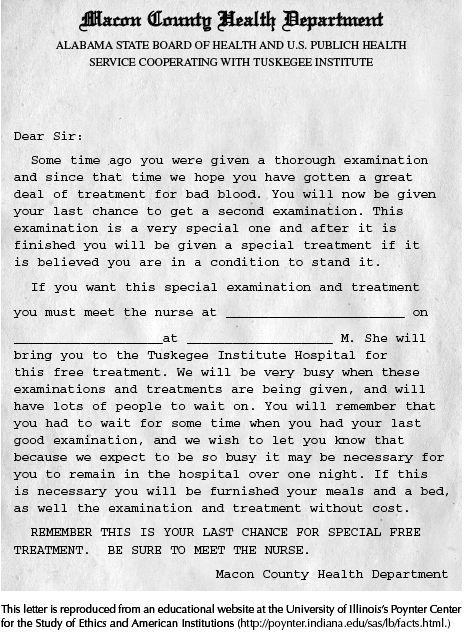Flashback Friday.
The Tuskegee Syphilis Experiment is one of the most famous examples of unethical research. The study, funded by the federal government from 1932-1972, looked at the effects of untreated syphilis. In order to do this, a number of Black men in Alabama who had syphilis were misinformed about their illness. They were told they had “bad blood” (which was sometimes a euphemism for syphilis, though not always) and that the government was offering special free treatments for the condition. Here is an example of a letter sent out to the men to recruit them for more examinations:
The “special free treatment” was, in fact, nothing of the sort. The researchers conducted various examinations, including spinal taps, not to treat syphilis but just to see what its effects were. In fact, by the 1950s it was well established that a shot of penicillin would fully cure early-stage syphilis. Not only were the men not offered this life-saving treatment, the researchers conspired to be sure they didn’t find out about it, getting local doctors to agree that if any of the study subjects came in they wouldn’t tell them they had syphilis or that a cure was available.
The abusive nature of this study is obvious (letting men die slow deaths that could have been easily prevented, just for the sake of scientific curiosity) and shows the ways that racism can influence researchers’ evaluations of what is acceptable risk and whose lives matter. The Tuskegee experiment was a major cause for the emergence of human subjects protection requirements and oversight of federally-funded research once the study was exposed in the early 1970s. Some scholars argue that knowledge of the Tuskegee study increased African Americans’ distrust of the medical community, a suspicion that lingers to this day.
In 1997 President Clinton officially apologized for the experiment.
Originally posted in 2009.
Gwen Sharp is an associate professor of sociology at Nevada State College. You can follow her on Twitter at @gwensharpnv.

